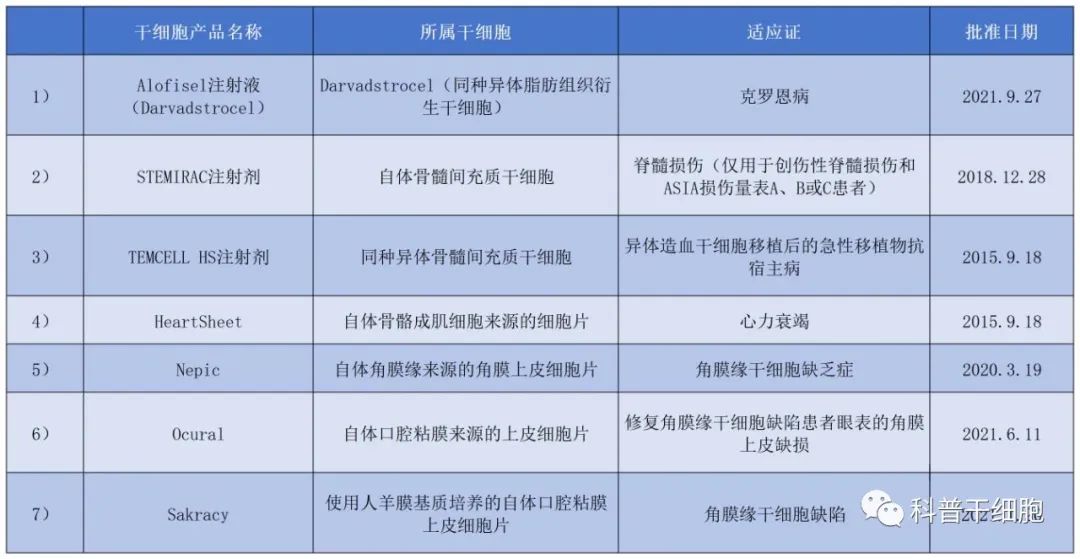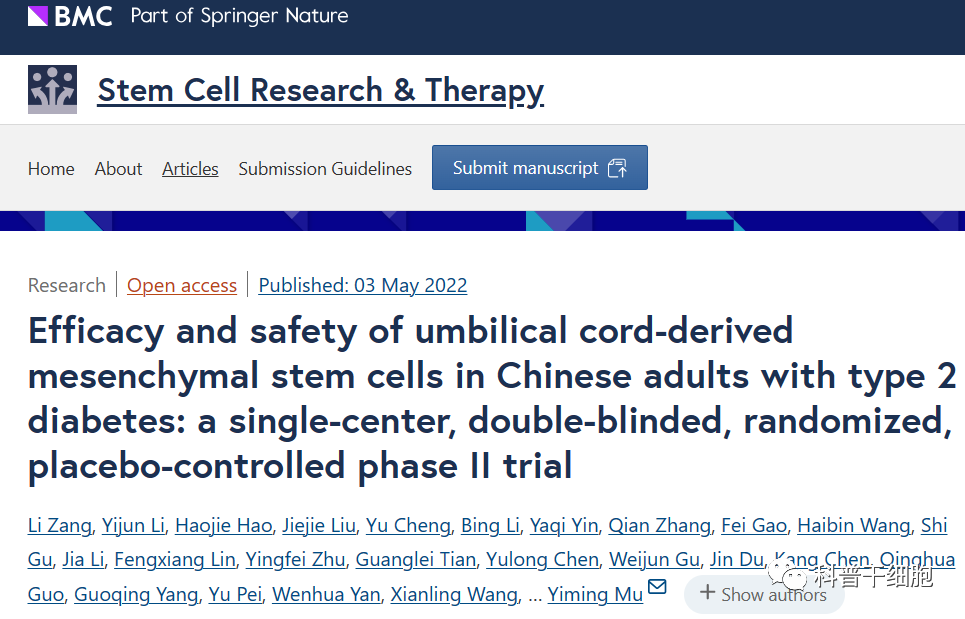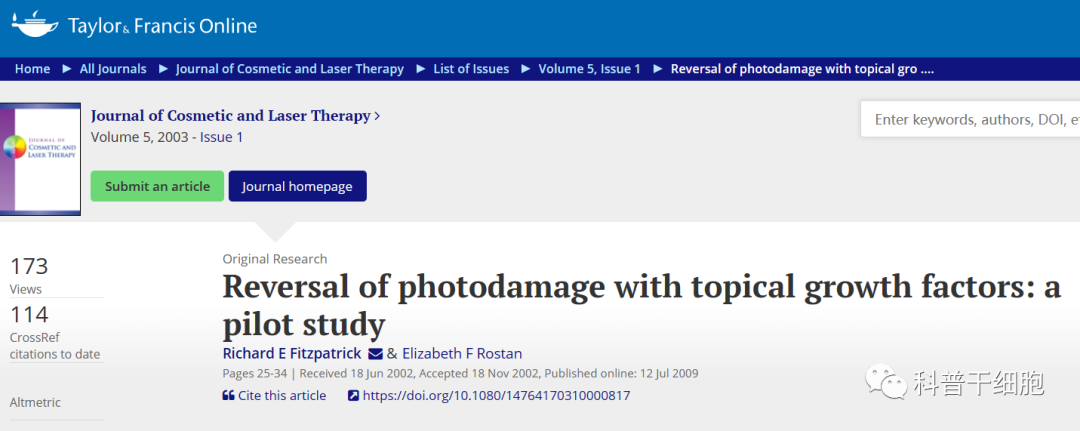
Source: Stone regeneration
In Japan, the research and development of stem cell treatments, known as regenerative medicine, has been led by the government. Since its launch in 2002, the country plans to increase support for clinical trials starting in 2011. Of the 18 preclinical research budget projects initially accepted, 15 projects have successfully entered the clinical trial phase.
Because regenerative medical products have biological characteristics and self-renewal ability, are regarded as "living" cells, and there are obvious differences between the active ingredients and the method of action and traditional drugs, Japan has formulated special laws and regulations to regulate it, and it is included in the coverage of medical insurance.

Japan approved the list of dry fine products
Does this mean that stem cell therapy has been fully recognized? Today, we're going to take a closer look at stem cells.
What are stem cells?
Stem cells are a kind of cells which have many abilities of differentiation, self-increment and self-renewal. Such cells have multi-directional differentiation potential and self-replicating ability, and can regenerate various tissues and organs, so they are called "universal cells" or "universal cells" by the medical community.
According to the source of tissue, stem cells can be divided into embryonic stem cells and adult stem cells.
According to the differentiation potential, stem cells can be divided into totipotent stem cells, pluripotent stem cells, and unipotent stem cells.
What is stem cell therapy?
Stem cell therapy is to take autologous or allogeneic stem cells, perform specific operations in vitro, and then input or implant them into the human body. This method can not only prevent and treat many diseases in clinical application, but also help realize facial rejuvenation, showing endless potential.
What clinical conditions can stem cell therapy be used to treat?
Stem cell therapy can be used to treat a variety of clinical conditions, including but not limited to:
1、Diabetes.
As early as May 2022, the team of Professor Mu Yiming of the Department of Endocrinology at the First Medical Center of the Chinese People's Liberation Army (formerly 301 Hospital), Have published their latest results in the journal Stem Cell Research & Therapy on the "Efficacy and safety of umbilical cord mesenchymal stem cells in the treatment of type 2 diabetes in Chinese adults" Phase II clinical trial. These findings suggest that mesenchymal stem cell therapy may be a potential treatment for adult type 2 diabetes mellitus (T2DM).

In this trial, a total of 91 patients with type 2 diabetes were randomized into two groups: mesenchymal stem cell therapy (UC-MSCs) group (45) and placebo group (46). Patients in the UC-MSCs group received three intravenous infusions, each four weeks apart, while the control group received a placebo infusion. All patients were followed up for 48 weeks.
Data from the 48-week study showed:
① In the UC-MSCs group, 20% of patients saw their glycosylated hemoglobin (HbA1c) levels drop below 7.0%, while their daily insulin use was also reduced by more than half. In the placebo group, the rate was only 4.55 percent. The difference was statistically significant (p<0.05).
② Comparing the change in HbA1c levels between the two groups, the UC-MSCs group decreased by 1.31% while the placebo group decreased by only 0.63%, again a statistically significant difference between the two groups (p=0.0081).
③ No serious adverse reactions associated with UC-MSCs treatment were observed throughout the study period.
Taken together, the study suggests that umbilical cord mesenchymal stem cells may be a potential treatment for type 2 diabetes in adults.
2、 Premature ovarian failure
Chinese scientists recently carried out a clinical study on the treatment of premature ovarian failure by mesenchymal stem cells in Nanjing Gulou Hospital. In this study, the scientists took the innovative approach of inoculating umbilical cord mesenchymal stem cells on a collagen scaffold and transplanting this collagen /UC-MSC complex into the ovarian site of patients with premature ovarian failure.

The findings show that mesenchymal stem cells have the ability to activate primordial follicles, thereby helping to save overall ovarian function. Treated patients showed elevated estradiol concentrations, improved follicle development, and an increase in the number of coelated follicles. Encouragingly, the patients with premature ovarian failure who participated in the study all successfully achieved clinical pregnancy.
These clinical cases provide strong evidence for the potential of stem cell therapy in clinical applications. Stem cell therapy shows a promising avenue to help restore ovarian function in patients with premature ovarian failure, which in turn increases the patient's chances of fertility.
3、Anti-aging

Foreign researchers conducted a study for a substance called stem cell growth factor, and selected 14 volunteers as experimental objects. The volunteers were asked to use the substance twice a week for 60 days. The results showed that the use of stem cell growth factor significantly increased the thickness of collagen in the volunteers' skin by 35 percent, and the arrangement of collagen fibers became more orderly. This change gives their skin a youthful glow again.
Future outlook
In addition to the previously mentioned diseases, mesenchymal stem cells have indeed shown promising applications in the study of a variety of diseases such as Alzheimer's disease, osteoarthritis, age-related macular degeneration, and related research has yielded a series of encouraging results.
In Alzheimer's research, mesenchymal stem cells were shown to be able to differentiate into nerve cells and replace damaged neurons, thereby slowing the progression of the disease. The study offers hope for patients with Alzheimer's disease by providing new avenues for treatment.
For osteoarthritis, mesenchymal stem cells have the ability to promote joint repair and regeneration. By transplanting mesenchymal stem cells, it can promote the regeneration of joint tissue, reduce pain and inflammation, and improve joint function. This technology has achieved some success in clinical applications, bringing benefits to patients with osteoarthritis.
In the study of age-related macular degeneration, mesenchymal stem cells are used to replace damaged retinal cells to restore vision. The study offers new options for the treatment of macular degeneration, giving patients hope of rebuilding their vision.
It can be said that in the human fight against disease, mesenchymal stem cells are playing an important role. With the continuous progress of science and technology and the cooperative efforts of scientists from various countries, it is believed that the light of biotechnology will become more and more bright and make greater contributions to the cause of human health.